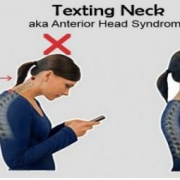Text-Neck: The latest risk to our spinal health
Ground breaking research helps explain the negative effects of consistently looking down at a smartphone.
A shocking survey from 2015 revealed that 53% of people listed their mobile phone as the most valuable item they would save during a house fire.
Mobile phones and tablets are becoming a staple in the average home. The concern here is that extended use of these devices with our heads in forward flexion creates a variety of unwanted health challenges. Doctors have even created terminology for this new condition called ‘Text Neck’.
Studies show that the average person spends 2-4 hours a day with their head tilted forward, reading and texting on smart phones. Students and children can be even higher!
The average head position when looking at a smart phone has been shown to register at 60 degrees (see image below), equalling 60 lbs (27.2 kilos) of extra pressure on the neck and joints. The trauma amounts to putting four heavy bowling balls worth of pressure on the neck and spine with each minute of looking down at a cell phone.

So what can you do?
Three key action steps to minimising the risk of spine and neck damage/pain from technology use include:
1) See your Chiropractor regularly. Chiropractic adjustments may help reduce wear and tear in the joints and discs, lower tension in muscles, and improve function of the nervous system. Your chiropractor will also be able to identify any permanent damage that may be occurring in your posture or spine.
2) Good Posture Habits – utilise tools that support spinal curves and posture when sitting including rolled up towels behind your low back, posture poles, standing desks or exercise balls in place of standard desks. Your chiropractor can also recommend exercises to help strengthen neck and back muscles and correct posture!
3) Head Positioning – keep devices elevated when texting or viewing to keep the head in a neutral position. You can also lay on your back and keep the phone over your head to reduce forward head strain.
Talk to us today if you or your family would liked to be assessed for a spinal health check. Caring for our spine early on in life and before we begin to experience negative symptoms could potentially help us all avoid a lifetime of chronic pain and disease.


